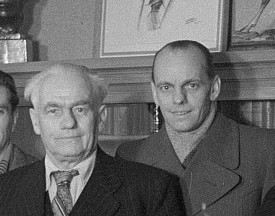Arthur Pieck
| Arthur Pieck | |
|---|---|

Arthur Pieck standing behind his father at President Pieck's birthday celebration
, 1946
|
|
| Born |
Arthur Heinrich Walter Pieck 28 December 1899 Bremen, Germany |
| Died | 13 January 1970 Biesdorf (Berlin), East Germany |
| Occupation | Typesetter Political activist Agitprop leader Agitprop stage show organiser Airline director |
| Known for | being his father's son |
| Spouse(s) | Margarete Lode (1902–1952) |
| Parent(s) |
Wilhelm Pieck Christine Häfker |
Arthur Pieck (28 December 1899 - 13 January 1970) was a qualified typesetter. He was a committed political activist who became a stage and movie actor and, later, a Communist party official. He topped off his unusually varied career, between 1955 and 1960, as a senior director - ultimately General Director - of Interflug, the East German national airline. After this he served, between 1960 and 1965, as a junior Transport Minister.
Arthur Pieck's father, Wilhelm Pieck, served as the President of East Germany between 1949 and 1960.
Arthur Heinrich Walter Pieck, the second of his parents' three recorded child, was born in Bremen where his father worked as a qualified carpenter and was active in local politics (). Arthur Pieck's parents had married early the previous year: his mother, born Christine Häfker, worked in the garment industry. His father was an active left wing member of the SPD and a consummate networker, as a result of which Arthur, while still a boy, could come into contact with stars of the contemporary socialist movement without leaving the family home. Visitors included Rosa Luxemburg along with Käte and and Franz Mehring. He attended secondary school in Bremen and then, after the family relocated, in Berlin. Between April 1914 and January 1918 he trained for work as a typesetter.
From an early age Arthur Pieck was also active politically. He was a leader in the in the Steglitz quarter of Berlin in 1914 and then for Greater Berlin from 1915. He joined the antiwar Spartacus League in 1916 which was the year in which he also joined the Independent Social Democratic Party ("Unabhängige Sozialdemokratische Partei Deutschlands" / USPD), a breakaway party formed by SPD members who found the SPD's parliamentary acquiescence in respect of war funding unacceptable. In 1917 he found himself arrested and indicted for "high treason" (... wegen "Hoch- und Landesverrats"). At the end of December 1917 he celebrated his eighteenth birthday by refusing to report for "military service": between February and November 1918 he lived in the Netherlands where the government had managed to avoid direct involvement in the fighting of the First World War An early appetite for journalism was apparent from his production of "Der Kampf" ("The Struggle"), a news sheet for German army deserters who had taken refuge in the Netherlands.
...
Wikipedia
